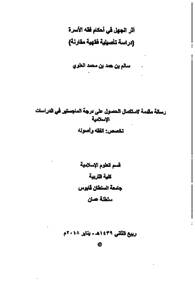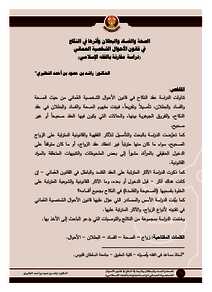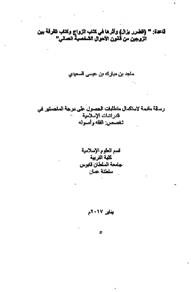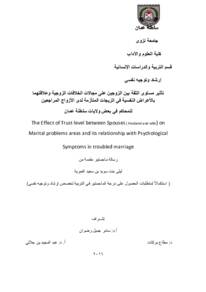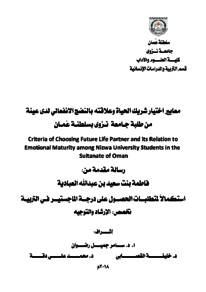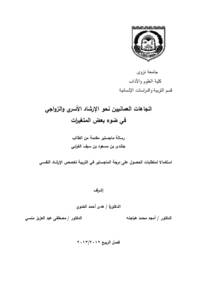Document
أثر الجهل في أحكام فقه الأسرة : دراسة تأصيلية فقهية مقارنة
Publisher
جامعة السلطان قابوس
Gregorian
2018
Language
Arabic
Subject
English abstract
This study is concerned with the issue of the impact of ignorance on family jurisprudence, as an underminer of legal capacity and a reason for mitigation of judgment in the Islamic law. The study sought with the help of Allah to arrive at a clear and integrated picture of the subject by illustrating obscurities, elaborating brevities and restricting ramifications and confusion. It made use of the words of
benefited from the scholars' statements on the jurisprudential application to the issues pertaining to family jurisprudence in both its sections: marriage with its consequences, and divorce with its consequences. The study has arrived - through all of this - at the drawing up of another classification of ignorance that is more appropriate in terms of its relevance to the Islamic Law provisions, as far as the researcher is concerned. Accordingly, ignorance is to be classified into three kinds: ignorance of the act, ignorance of the consequences of the act and ignorance of the ruling. The study has found that ignorance of the act is an effective excuse in Sharia rulings in which it is hard to guard against ignorance, but not otherwise. However, ignorance of the consequences of the act has always been found to be ineffective an excuse in the rulings of Sharia. The ignorance of the ruling, on the other hand, has three cases:
First: Where the scholars have stipulated that the ignorant be not excused. Specifically, this is the case of a Muslim who has been brought up in a Muslim society, yet is ignorant of the necessarily known facts of the religion, and of such of its rulings that one can in no way be ignorant of,
Second: Where the scholars have stipulated that the ignorant be excused, and includes the following:
1 -Ignorance of a new Muslim of something on which the ruling is different in various laws.
2 -Ignorance of one who did not have the means to gain knowledge.
3 -ignorance of the correct area of the independent judgment.
4 -Ignorance of the area of suspicion.
Third: Where the opinions of scholars have differed. This is the case of ignorance of a lay Muslim to whom the means to acquire knowledge was available, yet he was ignorant of something unknown to one like him among Sharia rulings other than what is necessarily known in the religion. Here, most scholars said ignorance is inexcusable; some said it is excusable. The researcher opted for the view of inexcusability in this case.
It appeared through the study that the care of jurists to clarify the impact of the various kinds of ignorance on the branches of family jurisprudence came in accordance to the effect of those kinds and the view that they can be an excuse in the ruling.
Description
رسالة جامعية
Member of
Resource URL
Arabic abstract
عنيت هذه الدراسة بالبحث في موضوع أثر الجهل في أحكام فقه الأسرة باعتباره عارضا من عوارض الأهلية وسببا من الأسباب الموجبة لتخفيف الحكم في الشريعة الإسلامية. وسعت الدراسة للوصول إلى الخروج بصورة واضحة متكاملة حول الموضوع من خلال بيان ما هو مشكل، وتفصيل ما هو مجمل، وضبط ما هو متشعب ومختلط، مستعينا بالله تعالى، ثم بالنظر فيما ورد من كلام العلماء في جانب التأصيل للأحكام الشرعية العملية عموما، وما ورد في جانب التطبيق الفقهي من مسائل وفروع متعلقة بفقه الأسرة في قسمية قسم الزواج وما يترتب عليه، وقسم الفرق الزوجية وما يترتب عليها. وقد توصلت - من خلال ذلك كله - إلى وضع تقسيم آخر للجهل هو الأولى من حيث تعلقه بالأحكام الشرعية فيما يبدو للباحث، وهو تقسيمه إلى ثلاثة أقسام: جهل بالفعل وجهل بما يترتب على الفعل وجهل بالحكم. وتوصلت إلى أن الجهل بالفعل يكون عذرا مؤثرا في الأحكام الشرعية التي يعسر الاحتراز من الجهل فيها، ولا يكون عذرا مؤثرا فيما لا يعسر الاحتراز منه، وأن الجهل بما يترتب على الفعل ليس عذرا مؤثرا في الأحكام الشرعية وأما الجهل بالحكم فله ثلاث حالات: الأولى: ما نص العلماء على عدم إعذار الجاهل فيها، وهي حالة جهل المسلم الناشئ بين المسلمين بما علم من الدين بالضرورة وبما لا يسع جهله من الأحكام. الثانية: ما نص العلماء على إعذار الجاهل فيها، وتشمل ما يلي:
1- جهل حديث العهد بالإسلام بما تختلف في حكمه الشرائع.
2 - جهل من لم تتوفر له أسباب العلم
3 - الجهل في موضع الاجتهاد الصحيح.
4 - الجهل في موضع الاشتباه
يخفى على مثله من الأحكام الشرعية غير ما علم من الدين ضرورة، فقال الأكثر: لا يعذر، وقيل: يعذر، واختار الباحث القول بعدم الإعذار فيها. وظهر من خلال الدراسة أن عناية الفقهاء ببيان أثر أنواع الجهل في فروع فقه الأسرة جاءت مرتبة حسب تأثير تلك الأنواع والقول بالإعذار بها في الحكم الشرعي.
1- جهل حديث العهد بالإسلام بما تختلف في حكمه الشرائع.
2 - جهل من لم تتوفر له أسباب العلم
3 - الجهل في موضع الاجتهاد الصحيح.
4 - الجهل في موضع الاشتباه
يخفى على مثله من الأحكام الشرعية غير ما علم من الدين ضرورة، فقال الأكثر: لا يعذر، وقيل: يعذر، واختار الباحث القول بعدم الإعذار فيها. وظهر من خلال الدراسة أن عناية الفقهاء ببيان أثر أنواع الجهل في فروع فقه الأسرة جاءت مرتبة حسب تأثير تلك الأنواع والقول بالإعذار بها في الحكم الشرعي.
Category
Theses and Dissertations

